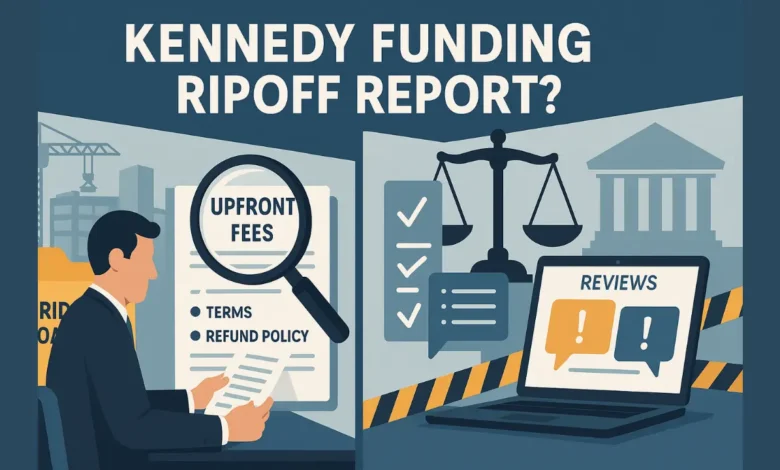Kennedy Funding Ripoff Report: What You Need to Know Before Working With Private Lenders

In today’s fast-paced financial world, borrowers often turn to private lenders for bridge loans, commercial real estate financing, and non-traditional funding options. One name that frequently surfaces in online discussions is Kennedy Funding, a direct private lender based in Englewood Cliffs, New Jersey. Alongside their track record of completed deals, however, potential borrowers may come across the Kennedy Funding Ripoff Report. This phrase refers to consumer complaints, online reviews, and published grievances—most notably on the Ripoff Report website—where clients have voiced concerns about upfront fees, unfulfilled promises, or miscommunication. Like many financial institutions, Kennedy Funding’s reputation is mixed, and understanding the whole picture requires separating facts from opinions. In this article, we will break down the meaning behind the Kennedy Funding Ripoff Report, examine the types of complaints that appear online, review court cases and public records, highlight the company’s own perspective, and provide practical tips for borrowers who want to protect themselves when working with private lenders.
What Is the Kennedy Funding Ripoff Report?
The Kennedy Funding Ripoff Report is not a single document, but rather a compilation of user-submitted complaints and discussions found on consumer websites, including RipoffReport.com, the Better Business Bureau (BBB), and blogs. These posts describe negative experiences by individuals and businesses who sought financing from Kennedy Funding.
Since Ripoff Report is an open platform where anyone can publish a complaint without external verification, the accuracy of these reports can vary. While some grievances may reflect genuine disputes, others might be one-sided or lack supporting evidence.
For borrowers researching Kennedy Funding, the phrase “Kennedy Funding Ripoff Report” serves as a digital warning sign, emphasizing the importance of thorough due diligence.
Types of Complaints Found in the Kennedy Funding Ripoff Report
When analyzing consumer feedback tied to Kennedy Funding Ripoff Report, a few recurring themes stand out:
Upfront Fees and Refund Disputes
The most common issue involves advance or reasonable faith fees. Borrowers claim they paid substantial amounts for due diligence or legal processing, but did not receive a loan approval or a refund when the deal fell through. This pattern has been echoed across multiple Ripoff Report entries.
Loan Approval Process and Transparency
Some borrowers allege that Kennedy Funding presented terms that differed from those initially discussed. This includes complaints about high interest rates, unexpected fees, or last-minute changes to loan terms and conditions.
Deal Closings That Never Materialized
Several reports describe situations where borrowers believed funding was imminent but ultimately did not receive financing. These clients often felt misled about their eligibility or the company’s willingness to fund their project.
Aggressive Legal Responses
Several accounts mention that disputes with Kennedy Funding escalated into litigation. Court dockets confirm that the company has been involved in multiple legal cases over the years, both as a lender enforcing contracts and as a defendant facing borrower claims.
Kennedy Funding’s Business Model Explained
To fully understand the Kennedy Funding Ripoff Report, it’s essential to grasp the company’s business model.
Founded in 1985, Kennedy Funding positions itself as a direct private lender specializing in bridge loans for:
- Commercial real estate projects
- Land acquisition and development
- Construction loans
- International lending
Unlike traditional banks, Kennedy Funding caters to borrowers who may not qualify for conventional financing owing to credit issues, unique property types, or tight deadlines. Because of this, their loans are often high-risk, high-reward—carrying higher interest rates and stricter terms.
This model explains why some clients praise Kennedy Funding for stepping in when banks refuse, while others express frustration with costs and perceived broken promises.
Legal Records and Court Cases Involving Kennedy Funding
One of the most reliable ways to assess the legitimacy of consumer complaints is by examining legal records. Public cases show that Kennedy Funding has been involved in litigation on multiple occasions.
For instance, in Quimera Holding Group SAC v. Kennedy Funding Financial LLC (2025), the company was named in a dispute regarding financing agreements. Other court documents reveal contractual disputes where borrowers challenged fee structures or alleged failure to deliver funding.
While the outcomes of these cases vary, they confirm that Kennedy Funding’s business practices have been subject to legal scrutiny, which is why the Kennedy Funding Ripoff Report continues to circulate online.
Kennedy Funding’s Response to Complaints
Kennedy Funding, like many private lenders, has defended its practices by emphasizing:
- Full disclosure of terms: The company states that it provides clear loan agreements outlining fees, conditions, and risks.
- Due diligence necessity: Advance fees are often positioned as a standard industry practice to cover the costs of appraisals, legal reviews, and underwriting.
- Track record of closings: Kennedy Funding highlights its history of closing billions of dollars in loans worldwide, claiming that most clients who meet requirements successfully secure funding.
The company’s official website and press releases portray it as a solution-driven lender that helps businesses access capital when traditional avenues fail.
How the Kennedy Funding Ripoff Report Affects Borrowers
The existence of the Kennedy Funding Ripoff Report raises valid concerns for potential borrowers. Negative online reviews can:
- Create distrust – Borrowers may hesitate to engage with Kennedy Funding after reading complaints.
- Impact negotiations – Knowledge of prior disputes may encourage prospective clients to request stronger contractual protections.
- Encourage better due diligence – Borrowers are more likely to consult attorneys, review contracts carefully, and verify company credentials.
In some cases, the complaints also serve as learning opportunities for clients entering into high-risk, private lending arrangements.
How to Protect Yourself When Working With Private Lenders
Whether you are considering Kennedy Funding or another private lender, the lessons from the Kennedy Funding Ripoff Report can help safeguard your financial interests:
Research the Lender Thoroughly
Check multiple sources: Ripoff Report, BBB, state regulatory agencies, and court filings. Look for patterns in complaints rather than isolated incidents.
Review Contracts Carefully
Always have an attorney review loan agreements. Pay special attention to refund policies, upfront fee structures, and termination clauses.
Verify Licensing and Credentials
Confirm that the lender is correctly registered in its state of operation and has no outstanding regulatory sanctions.
Demand Transparency in Fees
Ask for a written breakdown of all costs before signing. Legitimate lenders should have no problem clarifying their fee structure.
Maintain Documentation
Keep records of all communications, payments, and promises made during the application process. These documents are crucial in the event of disputes.
Compare Alternatives
Even if private lenders seem like the only option, compare offers from multiple sources to ensure you get the best deal. Sometimes, regional banks, credit unions, or crowdfunding platforms offer more favorable terms.
Balanced Perspective on the Kennedy Funding Ripoff Report
It’s important to note that not all experiences with Kennedy Funding are negative. Many borrowers report successful closings that enabled them to complete real estate deals or secure working capital.
The Kennedy Funding Ripoff Report represents one side of the borrower-lender dynamic. Some disputes may stem from unrealistic borrower expectations, incomplete applications, or misunderstandings about the high-risk nature of bridge loans. Others may highlight genuine issues in the company’s business practices.
In short, the truth lies in a gray area where both the lender’s and borrower’s responsibilities play a role.
Conclusion: Should You Trust Kennedy Funding Despite the Ripoff Report?
The Kennedy Funding Ripoff Report has become synonymous with borrower complaints, allegations of predatory practices, and disputes over upfront fees. However, like any private lender operating in a high-risk market, Kennedy Funding also has a proven track record of successfully funding deals and maintaining loyal clients.
You May Also Read: Gomyfinance.com Credit Score: A Complete Guide to Monitoring and Improving Your Financial Health




